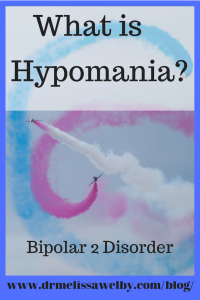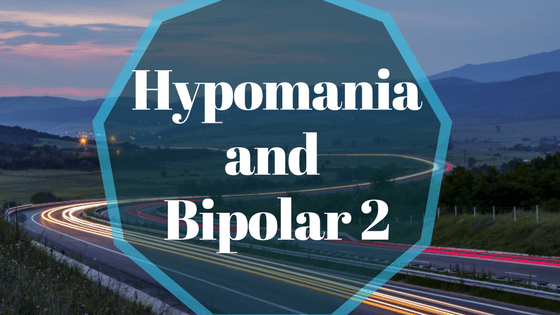When people think of bipolar disorder they often think of mania and the extremes that can happen. However, bipolar disorder exists on a spectrum with 2 main types: Bipolar 1 and Bipolar 2. Bipolar 2 is a milder (yet still uncomfortable!) form of bipolar. People with Bipolar 2 Disorder experience hypomania instead of mania. So what is hypomania and how is it different from mania?
In order to explain Bipolar 2, I will review the DSM-5 (the diagnostic manual for psychiatric conditions) criteria used to diagnose it and add the personal perspectives of someone who has experienced hypomania.
Lauren is a mental health blogger at Mentally Interesting: Live the Life You Want. Lauren was diagnosed with depression at age 12 and later was re-diagnosed with pregnancy-induced bipolar 2 disorder. She has been kind enough to share what it was like for her when hypomanic.
Bipolar 2 DSM 5 Diagnostic Criteria:
According to the DSM-5, Bipolar 2 Disorder is the presence of one or more major depressive episodes and at least one hypomanic episode. The hypomanic episode must last most of the day for at least four days.
What is hypomania?
The DSM 5 describes hypomania as a distinct period of abnormally and persistently elevated, expansive, or irritable mood and abnormally and persistently increased activity or energy.
What is needed to diagnose Bipolar 2 Disorder:
During the period of mood disturbance and increased energy and activity, three (or more) of the following symptoms have persisted (4 if the mood is only irritable), represent a noticeable change from the usual behavior, and have been present to a significant degree:
(The highlighted blue sections are the criteria in the DSM-5. Following it is Lauren’s experiences with hypomania.)
- Inflated self-esteem or grandiosity. Lauren: “I have experienced inflated self-esteem and grandiosity, but only on a couple of occasions. I remember thinking that everything seemed so clear and obvious. I felt like the Universe was telling me its secrets.”
- Decreased need for sleep (e.g. feels rested after only 3 hours of sleep). Lauren: “I experienced a decreased need for sleep. At one point, I was getting up at 4:00 am and this lasted a couple of months.”
- More talkative than usual or pressure to keep talking. Lauren: “My speech is “pressured” and I talk fast and forcefully.”
- Flight of ideas or subjective experience that thoughts are racing. Lauren: “I also experience racing thoughts. It feels as though my mind is a blender turned to high. Thoughts careen around my brain, making it very difficult to concentrate and/or focus.”
- Distractability (i.e., attention too easily drawn to unimportant or irrelevant external stimuli), as reported or observed. Lauren: “Sometimes racing thoughts lead to racing behavior where I literally run around the house trying to attend to all the thoughts I’m having.”
- Increase in goal-directed activity (either socially, at work or school, or sexually) or psychomotor agitation. Lauren: “When I experience hypomania I feel irritated, agitated and restless. Unfortunately, my hypomanias are almost always this variety. I get very impatient with other people and don’t understand why they can’t just do things MY way.”
- Excessive involvement in activities that have a high potential for painful consequences (e.g., engaging in unrestrained buying sprees, sexual indiscretions, or foolish business investments). Lauren: “I stop caring how my behavior is going to affect me. My ability to make wise choices goes out the window. I tend to spend more money when hypomanic so I try to stay far away from Amazon because I feel like buying everything. My heart races as I speed through town, driving recklessly, fueled by hypomania. I cruise through yellow lights, all the while driving too fast. I get irritated when I get behind a “slow person” and I whip my car around the offending vehicle and hit the gas.
The differences between mania and hypomania:
A hypomanic episode is similar to a manic episode but the symptoms are less severe. A manic episode must last 7 days in a row to qualify (hypomania requires 4 days). Unlike mania, hypomanic symptoms do not lead to marked impairment in social and occupational functioning and don’t necessitate hospitalization. Psychotic symptoms do not happen during a hypomanic episode but can during mania.
Treatment of hypomania:
The main treatments for Bipolar 2 Disorder involve mood stabilizing medications. The goal of these medications is to minimize mood swings- both to prevent the hypomanic and the depressive episodes.
Bipolar disorder is a recurrent condition. Medication is used to treat the current episode and also to prevent future hypomanic episodes. To do this, generally, medications are taken long-term. Ideally, the medication will prevent (or minimize) both the “ups and the downs” i.e. the hypomanic and major depressive episodes that happen in Bipolar 2 Disorder.
Lauren’s recommendations for self-care during hypomania:
“Caring for myself during a hypomanic episode means that I have to really monitor my mouth because I’m much more likely to say what I’m actually thinking. This isn’t all bad, but I try to avoid talking about controversial subjects. I remind myself that once words are spoken, they can’t be taken back. I put my “hypomanic filter” in place when I feel irritated with the world and use it to try to keep myself from hurting someone’s feelings or saying something I’ll regret later.”
“Just because hypomania isn’t full-blown mania doesn’t mean it’s harmless. These symptoms (racing thoughts, irritability, etc) are very uncomfortable to sit with. If you find yourself in a hypomanic mood state, be gentle with yourself. Try to slow down. Take deep breaths and think twice before making decisions. If your symptoms last longer than 4-5 days, consider contacting your doctor to let them know you are having an episode.”
Thank you, Lauren, for sharing your experiences with us!
If you believe you have experienced a hypomanic episode it is important to seek out a psychiatric physician to discuss your symptoms. Although Bipolar 2 Disorder doesn’t cause the same level of dysfunction as Bipolar 1 Disorder it can still be disabling and diminish quality of life. Treatment, although often not perfect, can be effective at improving your health and well-being.
Looking for additional mental health resources?
Visit my bookstore or resources page.
Here are books that I recommend related to bipolar disorder:[amazon_link asins=’0679763309,0465086640,1421412063,1608827666,1583335501,0385343809′ template=’ProductCarousel’ store=’drmelissawelb-20′ marketplace=’US’ link_id=’e30a035c-0e8a-11e8-9bb3-ef680728c682′]





Very helpful. I treat presently two Bipolar women and your write up clears any denial I might have had. Keep up the good work Bland Maloney lcsw
Thanks this post is really insightful – I have suffered with my own mental health battles so I am in no way ignorant to these subjects but I am always wanting to learn more , I work with young people from troubled back grounds so to learn more and get an insight of what some of them are experiencing is great – thanks for sharing this ???
Thank you! I’m glad it was helpful
Healing is possible when you have bipolar disorder, no matter how long you have had it.
http://www.addictionrehabcenters.com/
The bipolar 2, is sometimes how I feel. I’m not sure , also going thru menopause. Not on anything expect for anxiety. Can you give me any more resources, or info on this .
Of course, consulting a psychiatrist would be important in clarifying the diagnosis. There are other things that can mimic. There are a few books Im aware of specifically for bip 2. LEss than crazy: LIving fully with Bip 2, Bip 2 disorder workbook, and Why am I still depressed. Hope those help.